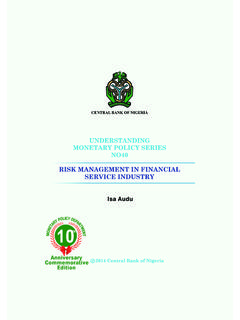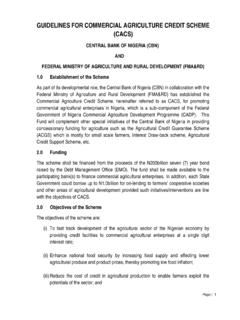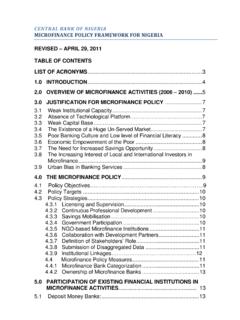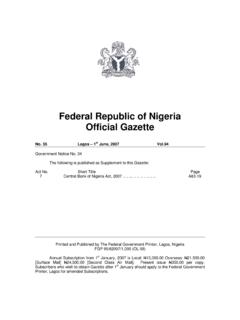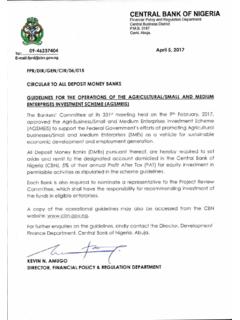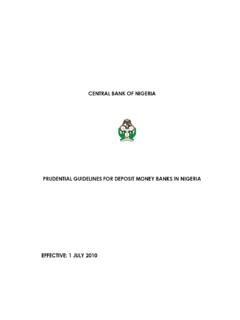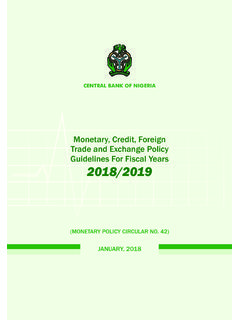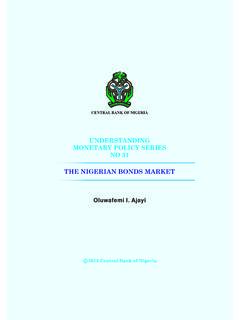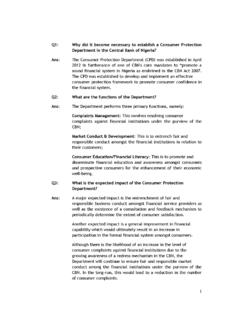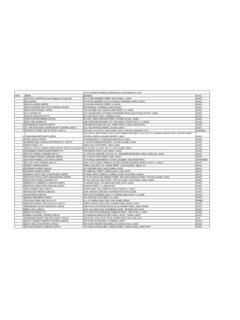Transcription of National Economic Empowerment & Developent Strategy …
1 March 2004 For Comments and Suggestions ONLY NIGERIA: National Economic Empowerment and Development Strategy NEEDS All comments and suggestions to: The NEEDS Secretariat, National Planning Commission, Federal Secretariat, Abuja Tel/Fax: 09- 5236625 Table of Contents Page Table of Contents 2 List of Acronyms 3 Executive Summary 5 The NEEDS at a glance 10 Institutional Framework for the Implementation of NEEDS 11 What s New or Different about NEEDS 12 Selected
2 Targets under NEEDS 13 Proposed Allocation of Federal Government Capital Budget among Key Priority Sectors 15 Part One: Introduction and Macroeconomic Framework 16 Introduction/Next Steps 17 Chapter One: Nigeria s Development Challenges/Background of NEEDS 19 Chapter Two: Statement of Vision, Values, and Principles 27 Chapter Three: The Macroeconomic Framework 31 The Real Sector Fiscal Operations and Policy: Budget, Tax Reforms and Public expenditure Management Balance of Payments Monetary and Exchange Rate Policies Part Two: reforming Government and Institutions 43 Chapter Four: Towards a More Efficient and Responsive Public Sector 44 Chapter Five: Security and Administration of Justice 54 Chapter Six: Tackling Corruption, and Promoting Transparency and Accountability 59 Part Three: Growing the Private Sector 62 Chapter Seven: Towards a Competitive Private Sector 63 Chapter Eight: Specific Sectoral Strategies 75 Chapter Nine: Trade and Regional Integration Policies 90 Part Four: The Social Charter and Implementation Strategy 93 Chapter Ten.
3 The Social Charter: Human Development Agenda 94 Chapter Eleven: Implementation and Financing 111 Annexes 126 List of Acronyms ACP-EU: African Caribbean, Pacific, European Union trade pact ADR: Alternative Dispute Resolution System AIAE: African Institute for Applied Economics BMIU: Budget Monitoring and Intelligence Unit BOI: Bank of Industry BOT: Build, Operate and Transfer BOOT: Build, Own, Operate and Transfer CBN: Central Bank of Nigeria CEDAW: UN Convention on the Elimination off all forms of Discrimination Against Women CET: Common External Tariff CRF: Consolidated Revenue Fund CSO: Civil Society Organization DAS: Dutch Auction System DFRRI: Directorate of Foods, Roads and Rural Infrastructure DMO: Debt Management Office DPRS: Department of Planning, Research and Statistics EFCC: Economic and Financial Crimes Commission ECOMOG: ECOWAS Monitoring Group ECOWAS: Economic Community of West African States EITI Extractive Industries Transparency Initiative FAAN: Federal Airports Authority of Nigeria FDI: Foreign Direct Investment FEC: Federal Executive Council FGN: Federal Government of Nigeria FOS: Federal Office of Statistics GDP: Gross Domestic Product HIPC: Heavily Indebted Poor Countries HIV/AIDS: Human Immune Deficiency Virus/Acquired-Immune Deficiency Syndrome ICPC: Independent Corrupt Practices Commission ICT: Information and Communications Technology IMF: International Monetary Fund IPP: Independent Power Plants Programmes IPO: Initial Public Offer ISO: International Standards Organization JPB: Joint Planning Board JV/JVC: Joint Venture (Cash) Operations MDG: Millennium Development Goals MTEF.
4 Medium Term Expenditure Framework NAFDAC: National Agency for Food and Drug Administration and Control NAPEP: National Poverty Eradication Programme NARCDB: Nigeria Agricultural, Rural and Cooperative Development Bank NCDP National Council on Development Planning NCS: Nigeria Customs Service NDE: National Directorate of Employment NEAC: National Economic Advisory Council NEC: National Economic Council NEEDS: National Economic Empowerment and Development Strategy NEIC: National Economic Intelligence Council NEPAD: New ( Economic ) Partnership for African Development NEPA: National Electric Power Authority NERC: Nigerian Electricity Regulatory Commission NES: Nigeria Economic Society NESG: Nigeria Economic Summit Group NEXIM: Nigeria Export Import Bank NGOs: Non governmental Organizations NISER: Nigeria Institute for Social and Economic Research NITEL: Nigeria Telecommunications NOA: National Orientation Agency NPC: National Planning Commission NPI: National Programme on Immunization NSITF: Nigeria Social Insurance Trust Fund ODA: Official Development Assistance OPEC: Organization of Petroleum Exporting Countries PPMC: Pipelines and Products Marketing Company PPPRA: Petroleum Products and Price Regulatory Agency PRSP: Poverty Reduction Strategy Process REWAMA Federation of West African Manufacturers RPED: Regional Programme on Enterprise Development ROT: Rehabilitate, Operate and Transfer SEEDS: State Economic Empowerment and Development Strategy SME: Small and Medium Scale Enterprises SMEDAN: Small and Medium Scale Enterprise Development Agency of Nigeria SMEIES: Small and Medium Enterprise Investment Equity Scheme TFP: Total Factor Productivity UBE: Universal Basic Education UEMOA: Union Economique et Monetaire l Ouest Afrique UNDP: United Nations Development Programme UNICEF.
5 United Nations International Children s Emergency Fund UNIDO: United Nations Industrial Development Organization US-AGOA: United States African Growth and Opportunity Act USAID: United States Agency for International Development WAMZ: West African Monetary Zone EXECUTIVE SUMMARY NEEDS is Nigeria s home- grown poverty reduction Strategy (PRSP). NEEDS builds on the earlier two-year effort to produce the interim PRSP (I-PRSP), and the wide consultative and participatory processes associated with it. NEEDS is not just a plan on paper, it is a plan on the ground and founded on a clear vision, sound values, and enduring principles. It is a medium term Strategy (2003- 07) but which derives from the country s long-term goals of poverty reduction, wealth creation, employment generation and value re-orientation. NEEDS is a nationally coordinated framework of action in close collaboration with the State and Local governments (with their State Economic Empowerment and Development Strategy , SEEDS) and other stakeholders to consolidate on the achievements of the last four years (1999- 2003) and build a solid foundation for the attainment of Nigeria s long-term vision of becoming the largest and strongest African economy and a key player in the world economy.
6 Although NEEDS is essentially a federal government programme, it is fully owned by Nigerians. The President and his cabinet fully endorse the programme; the National Assembly and the National Economic Council (NEC) which comprises all the 36 governors of the states have also endorsed the programme. Various private sector stakeholders, NGOs, and Civil Society Organizations have also endorsed the NEEDS. The Drafting Committee of the NEEDS reflects the wide ownership and participatory nature of the exercise. The 35-member committee comprises Ministers, Representatives of Ministries and Agencies, President of the Manufacturers Association of Nigeria; President of the Nigerian Labour Congress; Chairman of the Coalition of Civil Society Organizations; the Nigerian Economic Summit Group; etc. Further consultations are planned in the near term to get further inputs from major stakeholders that have not yet had a chance to contribute to the NEEDS, and thus ensure a fully participatory approach to the NEEDS design.
7 NEEDS builds on the progress made during the transitional phase of the new democratic dispensation (1999 2003). Evidently, most people underestimated the extent of social, political and Economic decay of the Nigerian society prior to the democratic transition. Despite the challenges, democracy has been consolidated with the first successful civilian-to-civilian democratic transition, and the Government has been able to deliver significant democracy dividends to the people. Nigeria has been successfully re-integrated into the international community and not only provides effective leadership under NEPAD and within ECOWAS but also now chairs the Commonwealth of nations. The size of the police force has been doubled since 1999; electricity generation has more than doubled, the telecommunications revolution with the number of telephone lines increased from about 400,000 in 1999 to about 3 million in 2003.
8 The various initiatives in agriculture have resulted in a boom--- with the groundnut pyramids returning in the North and the FAO in 2003 declaring that Nigerian agriculture grew by an unprecedented 7 percent. Industrial capacity utilization has more than doubled (from about 29 percent in 1999 to more than 60 percent in 2003). Foreign direct investment in the non-oil sector has grown from almost zero in 1999 to no less than US$ 2 billions in 2003. Consequently, the income level has grown by an average of percent in the period 1999 2003 (as against the average of percent with zero per capita income growth in the 1990s). The rate of unemployment declined from 18 percent in 1999 to percent in 2003 (with estimated million new jobs created during the period). Real wages have significantly gone up since 1999 thereby reversing the downward spiral in real income of workers that began since the 1980s.
9 This was the consequence of the wage hike in 2000 as well as the efforts to moderate inflation. Table I: Real Take Home Wages and Salaries in the Public Sector Source: Federal Office of Statistics Despite the progress so far, the challenges are still daunting, with the result that Nigeria faces a threat of not meeting the Millennium Development Goals if further major steps are not taken. Unemployment is still high (at in 2003 meant that about million people were actively looking for jobs without getting any). The GDP average growth rate of about percent is still lower than the minimum of 5 percent required to prevent poverty from worsening and the 7 percent needed to meet the MDG target of halving the incidence of poverty by 2015. Although a National poverty survey is in progress, projections from the 1996 poverty data suggest that poverty incidence could be as high as 70 percent. The rate of urbanization ( ) is one of the highest in developing countries, the HIV/AIDS pandemic is threatening social fabric, and the other social and Economic conditions are far from the people s expectations of a modern society.
10 There is still the challenge of reforming the public sector into an efficient and responsive instrument for delivering services to the people; corruption and fraud need to be fought ruthlessly; infrastructure decay needs to be reversed and the private sector empowered to become competitive and lead the growth process; and the weak and vulnerable groups need to be lifted up. Indeed, the general value-orientation of the people need to be reshaped to de-emphasize rent-seeking, over dependence on government for literally everything, and expectations of something from nothing--- and to promote hard work, entrepreneurship, discipline, honesty and respect for traditional values. The NEEDS, in collaboration with the State SEEDS, constitutes the reasoned response to the challenges of underdevelopment. The people will be mobilized around the core values, principles and programmes of the NEEDS and SEEDS.
